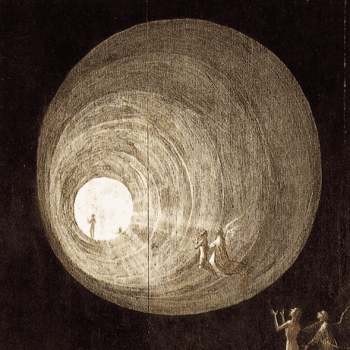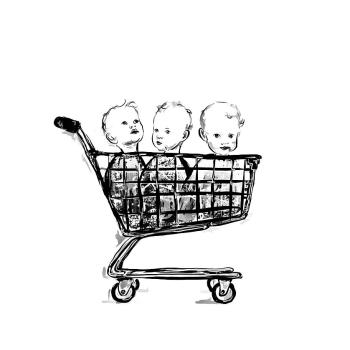Easter isn’t all new clothes, gorgeous masses in stunning church buildings and arguments about red shoes and foot washing.
In some places, Calvary is present in the lives of the people. The Church itself and all its Christian people hang on the cross of persecution.
In other places, such as the United States and Great Britain, society is moving along the continuum toward violent persecution. Christians in those two countries have come to expect and accept that they will be subjected to hate speech against Christians, Christian-bashing on web sites. They are increasingly being forced to accept that they face growing legal discrimination against Christians and moves to force Christian speech and expression out of the public sphere. We are at the “you can go to church all you want, but leave it there,” phase of discrimination, and this discrimination is rapidly becoming government-enforced.
At the same time, Christians in Egypt fear being kidnapped with no police support to stop it. Christians in Bangladesh have their children stolen and trafficked and again, the police do not punish the traffickers. Christians in North Korea are imprisoned and worked to death. Christians in Nigeria are murdered, tortured and their churches are burned.
I could go on. But there is too much of it for one post.
Here is this week’s roundup of Christian persecution in Six Quick Takes.
1. Nigeria: Easter Attacks Kill 80, Thousands of Christians Flee to the Hills
By BosNewsLife Africa Service – “Nigerian Christians appealed for prayers Tuesday, April 2, after Easter season violence in troubled central Nigeria left as many as 80 people dead and displaced some 4,500 others.
At least 19 people were killed since Easter Sunday when gunmen believed to be nomadic Muslim cattle herders attacked the mostly Christian Atakar group in Kaura district, a remote area of Kaduna state, officials said.
Witnesses said the attacks on three communities, including the Mafang and Zilang villages, killed many women and children. Kaduna police spokesman Aminu Lawan told reporters his forces were still investigating.
Ataka Christians live near Plateau state where authorities claimed fighting between cattle herders, who are mainly Fulani Muslims, and Christian villages killed nearly 60 people in recent days.
The area is on the uneasy dividing line between Nigeria’s predominantly Muslim north and largely Christian south…
Christians said that following Sunday’s violence, thousands of villagers fled to the nearby hills. (Read more here.)
2. Bangladesh: Christian Children Re-Captured By Trafficker
Eleven of the 16 Christian children who were rescued from Muslim traffickers in Dhaka, Bangladesh, on Jan. 2 have again gone missing. Sources in the Christian community, as well as reports in local newspapers, report that they believe the children were re-trafficked and taken to madrassas, Islamic training centers, where they will likely be forced to convert to Islam and study the Quran.
Eleven Christian children, originally from the Rangamati district of Chittagong Hill Tracts, disappeared for the second time earlier this year after being given back to the custody of their parents. “We were not aware that our child would be taken to a madrassa,” one parent told International Christian Concern (ICC).
The children, along with five others, had been rescued by police from a madrassa in the Abuzor Giffari Mosque Complex in Dhaka. The children had been missing for months. They were returned to their parents soon after their rescue, but traffickers continually threatened the parents until the recent re-disappearance of the children. Local authorities say the children were likely trafficked again to madrassas and are concerned that they will be forcibly converted to Islam.
“The [leader] of the traffickers gives a large sum of money to the traffickers to take the kids to the madrassa,” said an ICC source. “Because of this, they threatened the parents and took their children, again, to a madrassa. It is all because of large sums of money, and because there are no punishments for the trafficker.” (Read more here.)
3. North Korea: Number 1 for Christian Persecution
North Korea is the most hostile place for Christians around the globe, according to the annual “World Watch” list from the Open Doors Organization.
The list ranks the 50 countries where Christian persecution is most severe. North Korea tops the 2013 list, thus holding its ranking for the eleventh year running.
“Christians are classified as hostile and face arrest, detention, torture, even public execution,” the Open Doors report said. (Read more here.)
4. Great Britain: Majority of Church-Going Christians Feel Persecuted and Marginalized
Over two-thirds of Christians in the United Kingdom feel part of a victimized minority, and David Cameron is making that worse by redefining marriage, the Coalition for Marriage says.
In a new poll commissioned by the group, almost eight in 10 said the prime minister’s same-sex marriage plan will lead to those who back traditional marriage facing the sack.
More than two-thirds (67 percent) said they felt part of a “persecuted minority.”
Marginalized
The survey also showed that over half of the U.K.’s Christians who voted Conservative in 2010 would “definitely not” do so again in 2015.Colin Hart, campaign director of the Coalition for Marriage, said the poll showed “widespread and continued opposition towards David Cameron’s plans to redefine marriage.”
He added: “More worryingly it shows how Christians and those of faith are being treated like illegal aliens in their own country. They are being marginalized and persecuted for their beliefs. (Read more here.)
5. Egypt: Christians Targeted for Kidnappings
MATAI, Egypt (AP) — Ezzat Kromer’s resistance to his kidnappers did not last long. One of the masked gunmen fired a round between his feet as he sat behind the wheel of his car and said with chilling calm, “The next one will go into your heart.”
The Christian gynecologist says he was bundled into his abductors’ vehicle, forced to lie under their feet in the back seat for a 45-minute ride, then dumped in a small cold room while his kidnappers contacted his family over a ransom.
For the next 27 hours, he endured beatings, insults and threats to his life, while blindfolded, a bandage sealing his mouth and cotton balls in his ears.
Kromer’s case is part of a dramatic rise of kidnappings targetingChristians, including children, in Egypt‘s southern province of Minya, home to the country’s largest concentration of Christians but also a heartland for Islamist hard-liners.
The kidnappings are mostly blamed on criminal gangs, which operate more freely amid Egypt’s collapse in security since the 2011 fall of autocrat Hosni Mubarak.
Crime has risen in general across Egypt, hitting Muslims as well. But the wave of kidnappings in Minya has specifically targeted Christians, and victims, church leaders and rights activists ultimately blame the atmosphere created by the rising power of hard-line Islamists.
They contend criminals are influenced by the rhetoric of radical clerics depicting Egypt’s Christian minority as second-class citizens and see Christians as fair game, with authorities less likely to investigate crimes against the community.
Over the past two years, there have been more than 150 reported kidnappings in the province — all of them targeting Christians, according to a top official at the Interior Ministry, which is in charge of the police. (Read the rest here.)
6. United States: Pro Life Student Group Banned at Johns Hopkins University
.- A pro-life student group at Johns Hopkins University in Baltimore, Md., is appealing a denial of official recognition, saying that it is being discriminated against for its views against abortion.
Kristan Hawkins, executive director of Students for Life of America, told CNA that this decision is surprising, given that Johns Hopkins administration and students “pride themselves on being a ‘free speech campus’ – allowing dissenting opinions on campus and allowing a free exchange of ideas on campus.”
She added that there is a need for “upholding freedom of speech that isn’t popular.”
Voice for Life, a pro-life organization that is trying to re-start on the Johns Hopkins campus after several years of dormancy, has been rejected multiple times by the university’s student government, despite receiving clearance from the necessary committees as having met all campus requirements. (Read more here.)
















